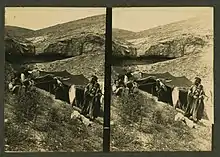Palestinian Bedouin
Palestinian Bedouins are a people that have historically roamed with livestock and other domesticated animals in the regions that roughly corresponds with areas to the west of the Jordan river.

Overview
Palestinian Bedouins became sedentary earlier than other Bedouins of the Middle East.[1] Some Palestinian activists have suggested that Israelis reinforce the Palestinian Bedouin identity in an attempt to divide and conquer suggesting that a divided Palestinian community is weaker.[2] The Palestinian Bedouin way of life has been affected significantly by the establishment of Israel due to the travel restrictions imposed.
Race-based chattel slavery was practiced among Palestinian Bedouins, as it was among other peoples of the region. Though slavery was legally abolished at the beginning of the 20th century, black Bedouins today still live in segregated communities in the Naqab.[3]
See also
References
- Litvak, Meir (2009). Palestinian Collective Memory and National Identity. p. 107.
- Le Febvre, Emilie (2012). Palestinian Activism in Israel. p. 128.
- Abu-Rabia, Safa (2012). "Is Slavery Over? Black and White Arab Bedouin Women in the Naqab (Negev)". In Mark LeVine; Gershon Shafir (eds.). Struggle and Survival in Palestine/Israel. University of California Press. pp. 271–288. ISBN 0520262530.
